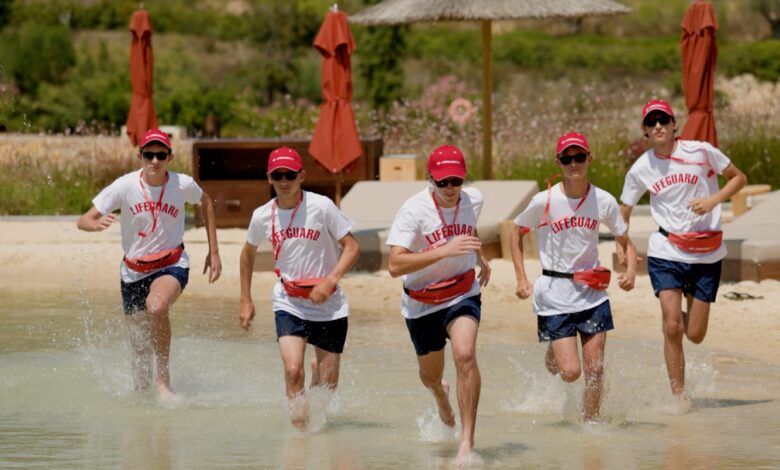Getting ready for a Summer as a Lifeguard

The role of a lifeguard envelops different responsibilities beyond the simple perception of swimmers. It requires consistent watchfulness, quick decision production, and the capacity to oversee emergencies speedily and productively. Lifeguards act as essential protection in safeguarding water safety and turning away accidents.
Significance of Lifeguard training:
Lifeguard training isn’t simply a custom; an extensive program furnishes people with life-saving skills and knowledge. The program includes a first aid and cpr course and covers many points, from water rescue techniques to CPR and first aid procedures, planning lifeguards for any situation they might experience.
Lifeguard classes Close to Me:
Finding lifeguard classes close by is essential for aspiring lifeguards. These classes are typically presented by local aquatic habitats, community schools, or certified organizations. By signing up for these classes, people gain active experience and mentorship from experienced instructors.
Essential Skills for Lifeguards:
While solid swimming skills are a fundamental requirement, lifeguards likewise need to foster critical reasoning abilities and viable communication skills. The capacity to evaluate situations quickly, pursue informed choices, and impart directions obviously can have a significant effect in an emergency.
Physical Fitness and Preparation:
Maintaining top physical fitness is a consistent exertion for lifeguards. Regular exercise schedules, strength training, and cardiovascular workouts assist them with remaining solid, spry, and prepared to respond to emergencies with speed and accuracy.
Investigating Emergency Procedures:
Emergency readiness is a main concern for lifeguards. They regularly survey and practice emergency procedures, for example, spinal injury management, water rescues, and utilizing life-saving equipment. This continuous training ensures that they can respond without hesitation and successfully in high-pressure situations.
Experience with Equipment:
Becoming capable of utilizing rescue equipment is a crucial part of lifeguard training. Lifeguards should be agreeable and skilled in utilizing devices like rescue tubes, backboards, AEDs, and first aid units. Regular equipment drills and reenactments build up their preparation.
Mental Readiness:
Being intellectually arranged is just about as significant as physical fitness for lifeguards. They should foster flexibility, stress management techniques, and the capacity to remain composed under tension. This psychological grit permits them to use wise judgment and keep up with the center during emergencies.
Sun Safety and Assurance:
Lifeguards spend long hours under the sun, focusing on sun safety. Wearing sunscreen with a high SPF, defensive dress, caps, and sunglasses, and remaining hydrated are essential propensities to forestall sunburn, parchedness, and intensity-related diseases.
Communication and Teamwork:
Viable communication and teamwork are essential skills for lifeguards. They should collaborate seamlessly with individual lifeguards, managers, and other staff members to ensure a planned response to emergencies and keep a protected environment for patrons.
Client assistance Skills:
Beyond safety responsibilities, lifeguards frequently act as ministers for the aquatic facility. Incredible client support skills, including being agreeable, polite, and accommodating, improve the general experience for swimmers and beachgoers.
Investigating Pool and Beach Rules:
Lifeguards should have an exhaustive understanding of pool or beach rules and guidelines. They play a crucial role in implementing these standards, educating patrons about water safety practices, and moderating expected hazards.
Lifeguard certification:
Getting lifeguard certification is a significant milestone for aspiring lifeguards. It approves their skills and knowledge as well as opens up opportunities for professional growth and headway inside the aquatic industry.
The Role of the American Lifeguard Association:
The American Lifeguard Association (ALA) is a reputable organization that sets elevated requirements for lifeguard training and certification. Lifeguards certified by ALA show competency, professionalism, and a commitment to maintaining safety standards in aquatic environments.
Concluding Thoughts:
Planning for a summer as a lifeguard is an extensive excursion that includes persistent picking up, training, and improving abilities. Lifeguards play an imperative role in ensuring water safety, preventing accidents, and giving a positive experience to swimmers and beach guests.
By focusing on physical fitness, mental readiness, viable communication, and acquiring certification from perceived organizations like the American Lifeguard Association, lifeguards contribute significantly to establishing protected and pleasant aquatic environments.



